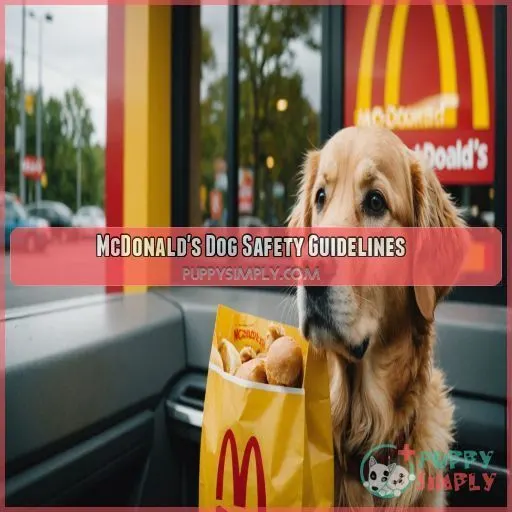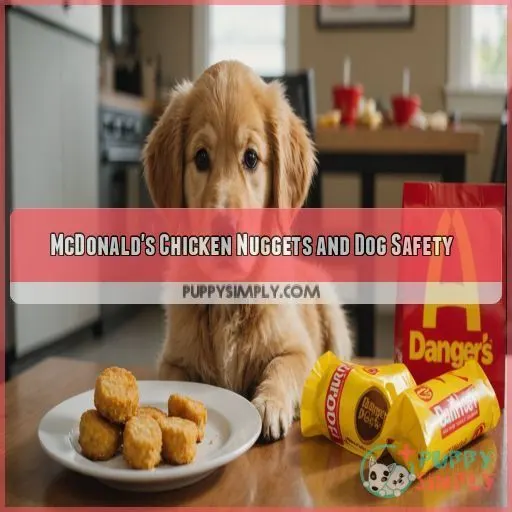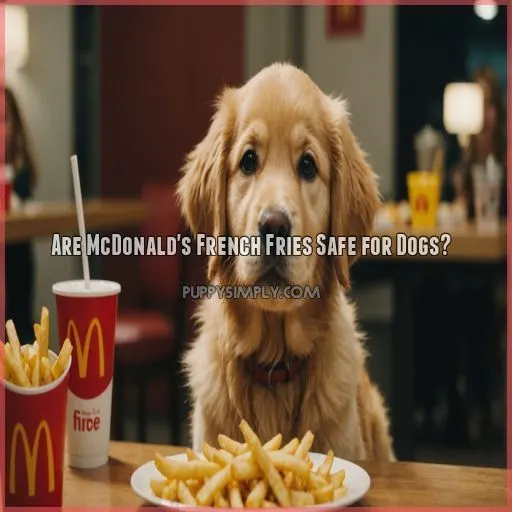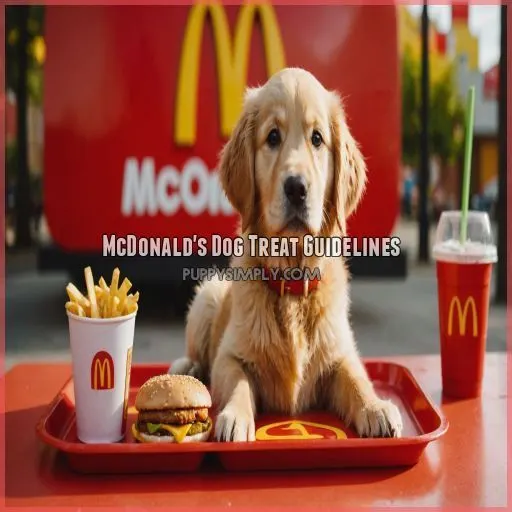This site is supported by our readers. We may earn a commission, at no cost to you, if you purchase through links.
 Sure, your dog might give you those puppy-dog eyes when you hit the McDonald’s drive-thru, but what’s safe for them?
Sure, your dog might give you those puppy-dog eyes when you hit the McDonald’s drive-thru, but what’s safe for them?
Honestly, not much. Most of what’s on the menu isn’t paw-some for pups.
If you’re going to share, plain and unseasoned meat is your safe bet—think a bit of plain hamburger patty.
Skip the onions, greasy toppings, and heavy salt—the canine tummy can’t handle those like yours can. It’s a bit like asking a goldfish to run a marathon.
Want to know more about keeping your furry friend healthy and happy? There are plenty of dog-friendly treats you can explore!
Table Of Contents
- Key Takeaways
- McDonald’s Dog Safety Guidelines
- Can Dogs Eat McDonald’s Burgers?
- McDonald’s Chicken Nuggets and Dog Safety
- Are McDonald’s French Fries Safe for Dogs?
- What to Do if Your Dog Eats McDonald’s Food
- McDonald’s Dog Treat Guidelines
- Safe and Responsible Snacking for Dogs
- Frequently Asked Questions (FAQs)
- Is it okay to feed dogs at McDonald’s?
- Can dogs eat nuggets from McDonald’s?
- Is McDonald’s dog friendly?
- What fast food can my dog eat?
- Can dogs eat McDonalds ice cream or McFlurry?
- Is the McDonalds Filet-O-Fish safe for dogs to eat?
- Can dogs have McDonalds hash browns or breakfast items?
- What are the long-term health effects of feeding dogs McDonalds food?
- How much McDonalds food is considered safe for dogs to consume?
- Conclusion
Key Takeaways
- Steer clear of McDonald’s burgers, fries, and chicken nuggets – they’re loaded with ingredients that can upset your pup’s tummy, like onions, grease, and salt. Stick to plain, unseasoned meat instead.
- Whip up some tasty, dog-friendly treats at home using lean protein, vegetables, and other wholesome ingredients. Your canine companion will thank you with a wagging tail!
- Moderation is key when it comes to treats, even the healthy homemade kind. Keep an eye on portion sizes and make sure they don’t make up more than 10% of your dog’s overall diet.
- Consult your vet for personalized advice on the best treats and snacks for your furry friend. They’ll help you navigate your dog’s unique dietary needs and ensure you’re keeping them happy and healthy.
McDonald’s Dog Safety Guidelines
It’s important to know which menu items are safe and which to avoid when it comes to treating your furry friend to McDonald’s. You wouldn’t want Fido chowing down on a Big Mac, only to realize those onions didn’t sit too well!
Potential Risks of Common McDonald’s Foods
Whoa there, pup parent! Before you go feeding your furry friend those juicy McDonald’s burgers, let’s talk about the potential risks. Onions, grease, and sugar in those patties can really upset a dog’s tummy. And don’t even get me started on the salt and seasonings – that’s a recipe for disaster! Time to get creative with some healthier homemade options.
Tips for Avoiding Harmful Ingredients
When you’re eyeing McDonald’s, keep an eye out for onion-free alternatives and safe burger prep. Condiments and dogs don’t mix well, so skip the ketchup and mustard. Instead, try homemade dog treats or look for dog-friendly restaurants. Prioritize your dog’s safety with healthy snacks suited to their dog diet. Remember, a little caution keeps tails wagging!
Understanding Canine Nutrition and Diet
Understanding canine nutrition is like knowing your dog’s playlist—healthy dog snacks can hit the right notes! Instead of hopping in line at a fast-food joint, keep an eye on these dog food ingredients:
- Look for quality dog food brands.
- Consider homemade dog food for control.
- Raw dog food isn’t a belly laugh, it’s a nutritional choice.
Dog-Friendly Alternatives to McDonald’s
Craving fast food for your pup? Forget the McDonald’s drive-thru and consider homemade dog treats instead! Craft dog-friendly burger recipes using lean beef and veggies. Swap McDonald’s French fries for carrot sticks—tasty but sans sodium poisoning woes. If dining out’s your jam, find dog-friendly restaurants with safe food swaps. Remember, healthy snacking options beat a sugar-laden ice cream!
Can Dogs Eat McDonald’s Burgers?
While McDonald’s burgers may seem like an easy treat for your canine companion, they can actually pose some serious health risks. From the onions and grease to the high sugar content, it’s best to steer clear of sharing your burger with your furry friend.
Onions and Their Toxic Effects on Dogs
Now, talking about onions and your dog’s health—they’re as harmful as a wolf in sheep’s clothing! Onions can wreak havoc on red blood cells, leading to anemia. Keep these three points in mind:
- Onions are toxic. Skip them entirely.
- Dog health first. Avoid burgers with onions.
- Watch for symptoms. Contact your vet if your pup has onion exposure.
Grease and Sugar Content in McDonald’s Burgers
Eating McDonald’s burgers isn’t a walk in the park for dogs and fries are off the menu too. The grease can be a slippery slope to bellyaches, and sugar’s no sweet treat for their health either. These burger ingredients aren’t just empty calories but can also lead to long-term dog health woes. So swap that for safer alternatives, and keep it all in moderation!
Ordering a Dog-Friendly Burger at McDonald’s
When ordering a burger for Rover, ditch the onions and opt for safe toppings like plain cooked meat. Ask for no bun or condiments, as those extras can upset your dog’s stomach. Instead, consider visiting dog-friendly restaurants with special menus. Remember, a Burger without onions is your dog’s best friend at McDonald’s—better safe than sorry, right?
Homemade Burger Alternatives for Dogs
If you’d rather not risk the potential dangers of McDonald’s burgers for your pup, consider whipping up some homemade, dog-friendly burgers instead. You can use lean ground beef, whole grain buns, and dog-safe toppings like carrots, sweet potatoes, or green beans. Your canine companion will appreciate the extra care, and you’ll have peace of mind knowing exactly what’s in their meal.
- Lean ground beef
- Whole grain buns
- Carrots
- Sweet potatoes
- Green beans
McDonald’s Chicken Nuggets and Dog Safety
You might think your dog deserves a taste of McDonald’s chicken nuggets, but these crispy treats can come with some serious health risks, like high fat content leading to tummy trouble and pancreatitis. Instead, save the nuggets for yourself and keep your furry friend safe by sticking to their own meals, unless you fancy a trip to the vet!
High Fat Content and Potential Risks
Chicken nuggets—oh boy, they’re definitely tasty but not so kind to your dog’s tummy. Packed with high fat, these nuggets can lead to health issues like pancreatitis, obesity, and digestive troubles. Let’s break it down:
| Health Risk | Outcome |
|---|---|
| Pancreatitis | Inflammation |
| Digestive Issues | Vomiting, Diarrhea |
| Weight Gain | Obesity |
| High Fat Content | Long-term Risks |
Home Remedies for Dogs Who Have Eaten Chicken Nuggets
If your dog’s in a tizzy after munching on McDonald’s chicken nuggets, don’t have a cow. Nausea and vomiting might pop up, so steer clear of food for a bit. Offer a bland diet, like rice and boiled chicken, and help settle their tummy with Pepcid AC. Keep an eye on their water intake to prevent dehydration.
Are McDonald’s French Fries Safe for Dogs?
While McDonald’s french fries may seem like an enticing treat for your canine companion, they can actually pose some serious risks. From the high caloric content to the potentially harmful ingredients, it’s best to steer clear of sharing your fries with your furry friend.
Ingredients in French Fries and Their Effects on Dogs
French fries may be tasty, but they’re not great for dogs. The high salt content, potato starch, and oils can upset your pup’s stomach faster than a wobbly puppy on a slick floor.
- Salt: Can lead to excessive thirst or sodium poisoning.
- Potato starch: Difficult for dogs to digest.
- Oils: Might cause diarrhea or pancreatitis.
Caloric Content and Macronutrients of French Fries
Let’s face it—French fries are a guilty pleasure for us, but for your pup, they’re a calorie-packed, salty snack. While humans might handle the fat content, carb breakdown, and sodium levels in moderation, dogs find these quite hard to digest. So, next time you’re eyeing that fry, remember your dog prefers a healthier treat!
Short-Term and Long-Term Effects of French Fries on Dogs
Indulging your pup in McDonald’s French fries might zap your taste buds but not their wagging tails! In the short-term, they may get a tummy ache or diarrhea. Long-term? Look out for:
- Weight Gain: Those extra calories add up.
- Sodium Concerns: Keep the salt away!
- Long-Term Health Issues: Consistent consumption isn’t paw-sitively healthy.
Comparing McDonald’s French Fries to Dog-Friendly Alternatives
While McDonald’s french fries may seem tempting, they’re a far cry from the healthy, dog-friendly alternatives you can whip up at home. Ditch the grease and salt, and try baking up some sweet potato fries or roasted veggie sticks – your pup will thank you! Just be sure to keep portion sizes in check.
| Ingredient | McDonald’s Fries | Homemade Sweet Potato Fries |
|---|---|---|
| Fat | High | Moderate |
| Sodium | High | Low |
| Carbohydrates | High | Moderate |
| Fiber | Low | High |
What to Do if Your Dog Eats McDonald’s Food
If your dog has indulged in some McDonald’s food, don’t panic, but it’s important to know what steps to take next. While those puppy eyes might’ve tempted you into sharing, some golden wrappers hide ingredients that could be less than friendly to our furry pals, so let’s explore what actions to take.
When to Consult a Veterinarian for Dog Food Poisoning
So your pup scarfed down a McDonald’s fry, or maybe a whole burger, and now you’re on red alert. Signs of dog food poisoning, like vomiting or lethargy, might mean it’s time for urgent care. Don’t hesitate—pet insurance loves a proactive pet parent! A quick vet visit beats any emergency vet bill that could fry your wallet.
Preventative Measures and Safe Snacking for Dogs
If your pup’s made a run for the Golden Arches, don’t fret! Here’s how to practice responsible snacking:
- Keep McDonald’s food out of paw’s reach; we’re talking Fort Knox level!
- Train dogs with healthy treats instead. They’ll love you for it.
- Enjoy dog park safety with a happy, healthy pooch.
Who knew safe snacking could be so fun?
Healthy Treat Alternatives for Dogs
Instead of reaching for those greasy McDonald’s leftovers, why not treat your pup to some healthier homemade snacks? From crunchy carrot sticks to frozen peanut butter bites, there are plenty of dog-friendly options that will have your furry friend wagging their tail with delight. Get creative and make snack time a fun bonding experience!
| Homemade Dog Treats | Natural Dog Chews |
|---|---|
| Peanut Butter Bites | Bully Sticks |
| Frozen Banana Slices | Antlers |
| Fruit & Veggie Snacks | Puzzle Feeders |
| ———————- | —————- |
| Carrot Sticks | Snuffle Mats |
| Apple Slices | Treat Balls |
Homemade Vs. Store-Bought Dog Treats
When deciding between homemade and store-bought dog treats, remember it’s like choosing between a home-cooked meal and fast food. While DIY treats allow control over ingredients, commercial brands offer convenience.
- Homemade ingredients guarantee quality.
- Store-bought treats provide variety.
- DIY treats can be a bonding activity.
- Commercial brands sometimes use preservatives.
- Quality comparison is key for your pup’s health.
Dog-Specific Treats and Their Benefits
After exploring homemade and store-bought treat options, consider dog-specific treats as they often cater to canine health needs. Packed with the right ingredients, these goodies offer a safe alternative to human fast food. They’re perfect for training sessions or as a tasty reward. Opt for treats that are low in additives, so your furry friend stays wagging, not dragging!
Social Activities and Non-Food Treats for Dogs
While dog-specific treats are a wag-tastic hit, your furry buddy might wag harder for social activities. Dog park fun or training games provide mental stimulation and exercise. Show affection with cuddles or make homemade toys—like an old sock filled with something crinkly. Trust me, your dog will love it with a wagging tail and slobbery smile!
McDonald’s Dog Treat Guidelines
When thinking about treating your pup, moderation is key. Consult your vet for personalized advice on appropriate snacks and make sure your canine companion always has access to fresh water.
Moderation in Dog Treats and Their Importance
You’ve found Fido eating McDonald’s food again, huh? Well, moderation’s key, or you might end up with a hefty pupper waddling around! Keep treats safe and healthy with these tips:
- Limit treat size to control weight.
- Balance them with regular meals.
- Keep an eye on overall health.
- Use treats as training rewards or alternatives.
Individual Dog Needs and Treat Selection
Different dogs, like different folks, have unique needs. Consider your dog’s breed, size, allergies, and health conditions when picking treats. A Great Dane’s snack isn’t a Chihuahua’s! Pay attention to treat size and frequency. Nobody wants a pooch with an upset tummy. Remember, treats are like dessert for dogs—enjoyable but shouldn’t be a main course!
Consulting Your Veterinarian for Personalized Advice
Picking treats can be like choosing a needle in a haystack, especially with dog health concerns lurking. Consult your vet for personalized advice on safe treat options, considering dog food ingredients
- Dietary needs (Do you have a picky eater?)
- Food allergies (Is Fluffy a sensitive soul?)
- Breed-specific advice
- Custom-tailored nutritional guidance
Your vet is your dog’s culinary confidant!
Ensuring Fresh Water Intake for Dogs
Ensuring your pup has access to fresh, clean water is really important after any treat, including those from McDonald’s. Aim for a water bowl size proportional to your dog’s size – you don’t want them lapping up grease and salt! Refill the bowl frequently, and watch for signs of dehydration like lethargy or refusing to drink. Staying hydrated is key to a happy, healthy dog.
| Water Bowl Size | Water Quality | Frequency |
|---|---|---|
| Proportional to dog size | Fresh, clean | Refill often |
Safe and Responsible Snacking for Dogs
When it comes to snacking, choosing the best options for your dog means avoiding those crispy McDonald’s fries they love to sniff, no matter how tempting their puppy eyes seem. Instead, focus on safe, dog-friendly alternatives that keep their tails wagging and tummies happy, ensuring treats are a fun, healthy part of their balanced diet.
Training Dogs to Avoid Unhealthy Foods
To avoid the McDonald’s lure, train your dog with positive reinforcement and establish healthy habits. Think of it like teaching them to avoid those leaky basketballs. Try these steps:
- Consistency: Stick to a routine.
- Substitutes: Use treat alternatives sparingly.
- Patience: Like watching paint dry.
- Praise: Celebrate victories with affection.
Choosing Safe and Appropriate Treats for Dogs
You’ve trained your dog better than those picky eaters at McDonald’s, so let’s chat about safe treats. Opt for homemade goodies to dodge allergies, and remember that moderation is key. Your pup’s health is like a fine-tuned recipe—keep it balanced. Watch for allergies and, like any good chef, consult your "vet-ronomist" for dog health tips!
Safer Alternatives to McDonald’s Food for Dogs
Instead of feeding your pup McDonald’s fare, why not whip up some delicious, dog-friendly treats at home? You can find easy recipes for:
- Homemade dog biscuits
- Frozen peanut butter pupsicles
- Carrot and apple chews
- Grilled chicken strips
- Veggie-packed meatballs
These wholesome options are safer, but they’ll also have your canine companion wagging their tail with delight!
Balancing Treats and Regular Diet for Optimal Dog Health
Now that you’ve explored safer alternatives, let’s talk balance. Imagine your dog’s diet as a see-saw: treats on one side, regular meals on the other. You don’t want it tipping! Keep treats at 10% of their diet to prevent a tubby pup. Use healthy snacks like carrots or apples to make sure your furry friend stays fit as a fiddle!
Frequently Asked Questions (FAQs)
Is it okay to feed dogs at McDonald’s?
Feeding dogs at McDonald’s is like giving them a mystery box with pitfalls like the dangers of Takis. Avoid onions and seasonings like the plague—stick to plain, unseasoned patties if you must. Dogs prefer fetch games over fast food, anyway!
Can dogs eat nuggets from McDonald’s?
You might think sharing McDonald’s nuggets with your dog is a perfect treat, but it’s a no-go. Their high fat content can upset Fido’s stomach faster than you can say "bad idea." Stick to dog-safe snacks!
Is McDonald’s dog friendly?
McDonald’s isn’t dog-friendly—no canine menus or designated spots. Still, you can grab a bite and nosh under the golden arches while your pup enjoys fresh air outside a balanced dog diet. Just don’t share nuggets; they’re a no-go for Fido!
What fast food can my dog eat?
Ah, fast food for dogs! While a plain patty isn’t terrible, it’s wise to skip the bun, onions, and seasonings. Homemade dog-friendly snacks are better; your dog will wagestly thank you later!
Can dogs eat McDonalds ice cream or McFlurry?
I’m afraid your furry friend should pass on McDonald’s ice cream or McFlurry. These sugary treats can upset their tummy. Instead, maybe try making a dog-friendly "pup-cup" at home with plain yogurt and a doggie biscuit!
Is the McDonalds Filet-O-Fish safe for dogs to eat?
Fishy Filet-O-Fish? It’s fishy business for dogs. While small bites might be okay occasionally, watch those toppings! Cheese, tartar sauce, and bun can upset tummies. Stick to pooch-friendly feasts to keep tails wagging and bellies happy.
Can dogs have McDonalds hash browns or breakfast items?
I wouldn’t recommend feeding your pup McDonald’s hash browns or breakfast items. They’re loaded with grease, salt, and other ingredients that can really upset a dog’s tummy. Stick to dog-friendly treats for a happy, healthy hound.
What are the long-term health effects of feeding dogs McDonalds food?
Feeding dogs McDonald’s regularly is like letting your pooch walk down the yellow brick road to health problems. It’s a shortcut to obesity, digestive troubles, and pancreatitis. Stick with healthy, balanced dog food for a brighter future.
How much McDonalds food is considered safe for dogs to consume?
Regarding McDonald’s food for your pet, less is more. Stick to plain grilled chicken strips in small portions. Avoid fries and burgers with toppings to dodge a furry fiasco later! Monitor for reactions.
Conclusion
Picture your dog’s wagging tail and eyes lit up at the smell of fast food.
While the temptation is real, it’s important to prioritize their health over McDonald’s treats.
Your furry friend may adore a plain burger patty, but most menu items aren’t safe.
avoid onions and greasy toppings to protect them.
Instead, explore healthier dog-friendly alternatives.
Understanding what dogs can eat from McDonald’s helps you ensure your pup’s well-being and happiness, keeping them safe and satisfied.













